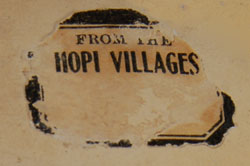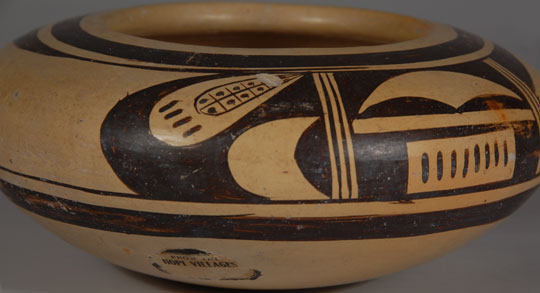Hopi Monochromatic Design Low Seed Jar [SOLD]
+ Add to my watchlist Forward to Friend
- Category: Modern
- Origin: Hopi Pueblo, Hopituh Shi-nu-mu
- Medium: clay, pigment
- Size: 2-5/8” tall x 6-1/8” diameter
- Item # C3207D SOLD
Nellie Nampeyo was one of three daughters of Nampeyo and Lesso. She was between the oldest daughter Annie and the youngest Fannie. She too was a potter and she lived to be 82 years old. Nellie was taken to the Grand Canyon, when just a child, when her mother was convinced to spend the summer there at the newly constructed "Hopi House" built by the Fred Harvey Company. Nampeyo was there to demonstrate pottery making for tourists but the whole family was intended to show the manner in which the Hopi lived.

In 1910, the business community in Chicago sponsored a United States Land and Irrigation Exposition in the Chicago Coliseum to draw attention to modern machinery as contrasted to what was considered primitive techniques of native cultures. Ever aware of an opportunity to lure travelers to the southwest, the Santa Fe Railway commissioned a brown stucco pueblo style house on-site to be inhabited by Indians from Hopi. Of course, Nampeyo was requested to represent the Hopi as the pottery maker, and her daughter Nellie, who was about 16 at the time, accompanied her parents on the Santa Fe train to Chicago. Nellie was perhaps one of the very few young Hopi who had spent a summer at the Grand Canyon and ridden a train to Chicago.
This bowl by Nellie was constructed in the traditional pueblo manner of coiling, scraping, and polishing the clay to a finished smooth surface on which a design could be painted using a paint brush fashioned from a yucca leaf.
The bowl is signed Nellie Nampeyo and there is a paper label attached to the underside of the style used by the Fred Harvey Company at the Grand Canyon.
Condition: The bowl appears to be in original excellent condition. Some of the brown paint has rubbed off but nothing of significance.
Provenance: ex.coll. Phoenix, AZ collector of Hopi pottery
Recommended Reading: Nampeyo and Her Pottery by Barbara Kramer

- Category: Modern
- Origin: Hopi Pueblo, Hopituh Shi-nu-mu
- Medium: clay, pigment
- Size: 2-5/8” tall x 6-1/8” diameter
- Item # C3207D SOLD



